
Recently on Cyclingnews.com |
An interview with Joe Parkin, April 25, 2009
Joe Parkin: Author and former road pro
Tyler Hamilton, Paul Kimmage and Lance Armstrong
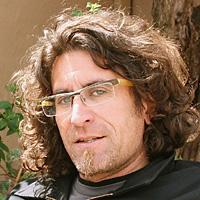
|
Ex-pro Joe Parkin wrote A Dog in a Hat in 2008, a book which chronicled his early years as a pro road racer in Belgium. He was transparent about the peloton's drug use back in the late 1980s and early '90s, and is working on a follow-up. BikeRadar's Gary Boulanger asked Parkin his thoughts on the current state of the peloton and how he'd approach things if this were 1987 all over again.
The interview took place at Parkin's Santa Cruz, California home seven days before news broke of Tyler Hamilton's second doping offence. We spoke with Parkin again after hearing the news.
BikeRadar: Wow – what can you say about the latest Tyler Hamilton news?
Joe Parkin: For
the record, I respect the man's athletic achievements, as well as the
self-destructive determination that enabled him to compete (well) after
the injury he sustained in the 2002 Giro d'Italia. I respect his drive and determination. If he
were standing right here in front of me, I would be the quickest to
stand up and offer a hand.
However, the current positive doping control is disturbing to me. I have heard of DHEA and know it to be a ghetto form of doping, and know of it being used by various unscrupulous club-level bike racers hoping to be the next world champion of the Thursday night criterium.
I have no reason to doubt what Tyler has told us, I just cannot understand why a rider who has basically bankrupted himself defending his name against a positive doping control, lost a marriage and spiralled further into depression, would take a product he admits knowing to be on the banned list.
"These days a rider can't take an aspirin without risking a positive!"- Parkin on 'doping' in cycling. |
If he took it of his own accord, then his retirement from the sport is unacceptable before receiving his penalty. If it was given to him (against his wishes or knowledge by team staff or anyone else) that person(s) deserves a severe beating.
How would you feel if
you jumped into the professional scene today as a young rider?
I
don't know if I could speak about the current climate, but I recently
chatted about this with my former team-mate Alan Pieper and Columbia director and
former racer Brian Holm. We had a candid discussion about doping then
versus now. Brian named a few products he took during his career, stuff
that wasn't detectable. !
It would be cool racing as a young rider for a team like Garmin, knowing that you could race clean. When I first turned pro my eyes were opened and I was shocked, wondering how to do it clean. Doping was looming over everyone like the grim reaper. It's neat to know some people are working hard to clean up the sport these days. There will always be some new way to beat a new control; doping may not ever be wiped away from the sport completely.
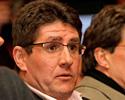
|
How do you see
yourself compared to an anti-doping crusader like Irish journalist Paul
Kimmage? You guys were racing contemporaries, and have both written
books on the subject of doping...
Kenny Pryde gave me a copy of Paul's book, A Rough Ride, when it came out, as I was finishing the Tour of Ireland. I read it
straight through, and got the sense he was saying if it wasn't for
doping, he would have been a better cyclist.
He was good, but he didn't have what it took to win the Tour like compatriots Stephen Roche or Sean Kelly. His book came off like a big package of sour grapes. His Irish team-mate Martin Earley lost all respect for Kimmage after the book was published. Paul also didn't make any fans in the peloton back then.
I will tip my hat, however, for his opening the eyes of outsiders to how serious the doping problem was back then. I was trying to be careful in my book that I would talk about doping without pointing too many fingers, and not lay a claim that I would have been a champion had I doped.
Cycling is a beautiful sport. To me – and I know this will sound bad – the doping part of cycling doesn't make it bad. There's doping in several sports: tennis, soccer... people are doped in office cubicles! Being jacked up on caffeine or taking drugs one can't take as a cyclist.
In my opinion, Paul certainly overstepped things a bit during the pre Tour of California press conference with Armstrong. It appears Paul is on a crusade that's more anti-Lance than anti-doping. Say what you will about Lance, he's brought bike racing to the American conscience, boosting the bike industry, the cause for cancer, etc.
Do you think dope-using confessions like those given by
Bjarne Riis and Frankie Andreu are good for the soul, as well as the
sport?
When I heard Bjarne confess, I felt he needed to
share some of the spoils of that 1996 Tour de France victory with everyone in the peloton.
My only experience racing with Bjarne was in kermis races in the late 1980s. I
love Frankie. I don't have a problem with his doping confession
because I thought he handled it properly.
Jerome Chiotti's doping 'confession' is one I had a hard time with. I raced against him in the dirt, and the pace off the line was so incredible, it put myself and others in a spot of bother. We always would lose a little gap, then try to collect ourselves, but it was apparent in hindsight that losing confidence because of that speed hindered our results. Chiotti's confession was more a slap in the face.
It's hard to look back at those races and try to figure out how the results would have differed if it was a level playing field.
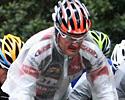
|
Who's lost your respect in the pro peloton, and why?
No
one has really lost my respect as a cyclist, although there are two
Americans that I wish wouldn't have contested their positive test
results so vehemently. I've raced mountain bikes with Floyd Landis, and
raced with Hamilton when he was a stagiaire with Coors Light.
They're great guys. They got these amazing results as racers then got
popped for doping. I have no reason to believe the control results were
wrong, and I have no reason to not trust the word from either of them.
I've had several friends get popped for doping, and when someone goes positive, 50 percent of the people think the results were rigged, while the others think the riders are guilty. Popular perception will always be the same in cases like this.
Floyd and Tyler both fought it, and came out poorer in many ways. I wish they would have come out with statements saying they know what they did and didn't do, and do it clean. As for other riders, I either respected them or not. That feeling hasn't changed.
If you were looking to enter the pro peloton in 2009, how would you do it compared to 1987?
It
seems like the best path these days is for a mountain bike racer to
become a road racer. I would go at it from a cyclo-cross angle first,
hoping to get picked up by a professional road team. I still think
going to Belgium first is the best way to get one's feet wet. I always
encourage those trying to make it to take that route.
That's how
Dave Zabriskie got noticed by Johan Bruyneel, as a U23 rider in
Belgium. Ditto Trek-Livestrong rider Bjorn Selander and some others...
In
Belgium one doesn't need a team; you can just show up and race. It
doesn't help to just race the flat stuff, though. It hurts you in the
hills. The first year I was in Belgium I often drove to do hillier
races.
Who was the best all-around racer of your era and why?
Wow, that's a tough question. I've raced with some amazing guys: Lucien
van Impe, Hennie Kuiper, Joop Zoetemelk, Lance Armstrong...
I'm still of the opinion the greatest racer ever was Greg LeMond. He could climb off the couch and win races. He could come back from the off-season soft and doughy, and within a week he'd be ripped. Hands-down amazing.
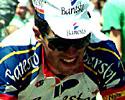
|
The most brutal attack I ever saw came from Gianni Bugno. I almost gave up racing watching him attack. Lance was very sharp during his early years.
As far as the best palmarès before, during and after my career: Sean Kelly, hands down. He was the last of the all-rounders, winning Classics in between racing a local kermis. He loved to race, and his results reflected that. The years I did 140 races were my best years as well. If I was cut down to 100 races I didn't do as well.
I was recently riding with BMC's Taylor Tolleson, and we talked about the volume of racing we did back then. He was shocked; never heard of anyone doing that these days. They just don't race as as we did back then. I still think the experience was better to race more.
Who was the meanest racer?
Definitely
Jelle Nijdam. I hated the guy. I got punched by him in races a few times!
He didn't care for me much and made it known. Was it because I'm an
American? Not sure, really. I had a unique position on the bike, was
quiet and didn't make much noise. He was a loudmouth. Still hate him, actually.
Which racer, from any era – including now – has your utmost respect and why?
My favourite is Adrie van der Poel. We were teammates. He's
the epitome of work ethic. He wasn't born a racer, he made himself a
great bike racer. He had good team managers to motivate him along the
way. He wasn't as well rounded as Sean Kelly.
Adrie and I had the same body style and rode the exact same size bike. He's was an amazing all-rounder: he could sprint, and time trial well enough to stay out of trouble, winning classics, Grand Tour stages, national championships and cyclo-cross races galore. He was awesome, and many people these days probably don't remember him as well as I do.
"I wanted to make a living at it the right way, which was to go to Belgium."- Parkin starts his pro' career. |
Who was your cycling childhood hero, and do you remember what the first televised bike race was that really raised your heart rate?
I was a BMXer as a kid. I didn't get to race much, but appreciated a guy named Anthony Sewell, who rode for various local teams including JAG. I got to meet and hang out with him. The team was owned by my soccer coach, Renny Roker, who worked for Casablanca Records (Kiss, Donna Summer, Parliament).
My first vision of cycling on TV was Paris-Roubaix, in 1984 or '85. I had seen bike riders on the road in southern California. It didn't look all that cool, really. They were more of the touring type; I was in to BMX, motocross, and the road bicyclists looked slow. Then I saw Roubaix on TV: these guys are trying to kill each other on cobblestones! They were riding through towns straight out of World War II movies. I knew I had to be part of it somehow.
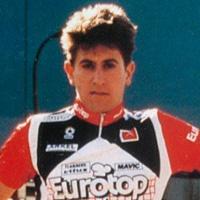
|
Aspiring to be a professional bike racer in the mid 1980s must have fallen on deaf ears. Beyond Bob Roll, were you tight with any other American pros of that era?
Bob was the only guy I knew. I knew others through the magazines I read. My dad had a strong desire for me to go to a military academy, and I knew I didn't want to become an engineer. I was more liberal arts minded. Bob told me to go to Europe, and my mom was amazingly supportive. She wanted me to give it a try.
I had seen these guys working at bike shops, the stereotypical angry guy who's been trying to make a living as a racer too long, and I didn't want to be like them. I wanted to make a living at it the right way, which was to go to Belgium. There were guys I was riding with in the club in Danville, California, who helped out emotionally.
Jonathan Boyer blazed a trail for Americans in the European peloton in the late 1970s and early '80s, having raced with Bernard Hinault and Sean Kelly. The path was widened tremendously by Greg LeMond, then the 7-Eleven gang. How come you didn't latch onto that squad from the get-go?
That was a strange thing, with 7-Eleven. Another American pioneer was Mike Neel, who was manager of the 7-Eleven junior programme. I was racing against Scott McKinley and other locals. I was a last-year junior when I moved to northern California in the mid 1980s, and they weren't going to take someone half way through the season. They didn't know me from Adam.
Going to Europe, I had the opportunity to ride with some of the 7-Eleven guys who didn't live too far away. I'd often bang on Bob's door and we'd go for a ride. There was some talk with team director Jim Ochowicz about joining them when I turned pro. They gave me a bike, in fact, but, it never quite worked out.
The timing wasn't quite right, the offer never came. When one of my team sponsors fell through, I called Och to get a ride with them, but the terms of the offer weren't all that good. And in hindsight it wasn't a good idea to do that. I wouldn't be here today if I would have taken the offer.
You mentioned feeling flat about being a bike racer in the US after returning from Belgium the first time. How did it feel racing for Coors Light, a team that struck fear into the domestic peloton at every event it appeared at in the early 1990s?
Riding for Coors Light was a blast! (Team director) Len Pettyjohn would have been my favourite if he would have led a team in Europe. The guy always stood by his racers, whether he agreed with me or not. Extremely organised and one of the smartest I've ever met. I liked riding with certain members of the team, some more than others.
It was fun riding for such a dominant team; I never rode for a team like that in Europe. I had a good time with Coors, but we were 'going to a knife fight with machine guns'. In some ways it was cool to flex our muscles, racing against hobbyists while we were getting paid to race our bikes full-time. It was lost on me a little bit, though.
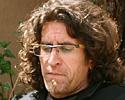
|
Let's talk equipment. Skinny steel frames and down tube shifters were the extent of high-tech when you became a pro, then there was a noticeable tipping point with componentry in the early '90s, with Shimano's STI, then Campagnolo's ErgoPower integrated brake-lever shifting. Clipless pedals made a big splash in the late '80s, and composite frames were just starting to catch on. What was the best road racing bike you ever had and why?
There were a few I liked best. The nicest road racing bike was my Coors Light titanium Serotta. It was the only race bike I couldn't pull out of alignment within a week. I remember descending at 50mph during the Tour du Pont, super-tight in the peloton. I'm pouring a Coke into a water bottle for Scott Moninger with no bike-handling issues. The fork was kinda of janky, though; I had a hard time getting it to turn like I wanted it to.
One of my favourite bikes in Europe was the aluminium Vitus I raced Paris-Roubaix on in 1988. It was totally cashed after the race. I loved it; it was a comfortable, floppy noodle.
A bonded carbon fibre Koga-Miyata with the 'new' Shimano STI shifting was my favourite in Europe. I was only allowed to ride it in some of the hillier races later in the season. For kermis races I could only use a steel Koga-Miyata with down tube shifters.
You wrote about focusing your efforts on being a King of the Mountains/polka-dot jersey rider, when in hindsight putting your efforts on the Classics might have played out better for your road career. Still think that's the case? So many of the Classics riders are HUGE these days: Cavendish, Boonen, Cancellara, Hushovd...
In hindsight, my whole KOM fixation came from my junior days 'racing' to the junction halfway up Mt Diablo from the California Pedaler bike shop with my club. I won the KOM polka-dot jersey so much it became ingrained in my head! I also started noticing pictures of Lucien van Impe and his veiny legs. He won the KOM jersey in the Tour de France many, many times.
I figured out quickly I didn't have the motor for climbing the big stuff. I could do the small stuff, but the big climbs were over my budget. I hardly ate anything to keep my weight down to be prepared for the hills. Instead of being 148lb, I should have been closer to 160lb to handle the cobbles better.
Which race was your favourite and why?
Certainly the beautiful races were Flanders and Roubaix, but for some reason I always rode well in Gent-Wevelgem. I don't think I ever dropped out the four or five times I raced it. The first time I did G-W I was already used to not doing well as an amateur in that race. I was getting used to making the second echelon with the heavy crosswinds, and when we turned a corner into 40km of crosswind action of the pro event, I found myself in the first echelon.
You ride a race well once, and you're inspired to do it again. This boosted my confidence for the next year. Another good race memory for me was GP-Pino Cerami. A tiny bit of confidence goes a long way. Gent-Wevelgem will always be one of my favourites.
What was the most money you ever made in a year as a professional? Which year and which team?
The most money I ever made in Europe was with Tulip in 1991. I raced a lot that year, and my director José Decauwer knew he could rely on me. We won CoreStates in Philly with Michael Zanoli that year. Between salary and prize money I probably took home $35,000 to $40,000.
Rider's pay was always dependent upon the size of the team. Domestiques don't make that much money, but they get taken care of with prize money, both after the race and at the end of the season. It doesn't happen with every team, but with most. Everyone gets a cut but the directors.
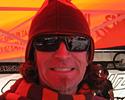
|
"Flemish was like listening to a drunk Englishman speak."- Parkin learns the language. |
Was it hard learning the local languages in Belgium? Are you still fluent in the 'tongue of the peloton'?
I think the tongue of the peloton has turned into English! I went to Belgium as a national merit scholar in French, and realised it didn't help me at all. I heard that Flemish was a combination of French and German, which wasn't the case.
The family I lived with didn't speak much English, nor did anyone else in the small town. I just shut my mouth and listened. I always thought Flemish was like listening to a drunk Englishman speak. The rural dialects were very thick. I learned a lot from reading the newspaper and watching the news.
My host family would laugh at me at first. Riding with TVM meant I needed to speak Dutch and proper Flemish because no one spoke much English. I have a friend from back in the day who communicates in Flemish, and I respond with a combination of Dutch, Flemish and English. It wouldn't take much effort to get it back.Like fellow American racer John Tomac, you raced professionally in other disciplines, including cyclo-cross and cross-country. Not many professional cyclists seem to be doing that these days, Tim Johnson and Bjorn Selander being the exception.
Do you think everyone has become too much of a specialist, or are they just soft?
I think because of the current pressures of racing, many riders aren't willing to do different things. Looking back, I wish I would have started mountain bike racing sooner, which helped my road racing, as did cyclo-cross. I had the best engine to go hard for an hour. Being well-rounded is a good thing.
Which did you enjoy more, cyclo-cross or cross-country?
It's a toss-up. I liked the technical aspect of mountain biking. I wish I'd actually tried down-hilling; I've always been a good descender. From an ego standpoint, cyclo-cross was better. I enjoyed being part of the mountain bike scene back when NORBA had the big bucks and hoopla like the motocross scene. It was fun.
Do you think your former Coors Light teammate Davis Phinney's son Taylor will make it on the road or just dominate on the track? He's a huge kid in the Boonen sense of the word...
If he will embrace the Classics he could eclipse everyone. LeMond went for yellow at the Tour, and it cost him the Classics against Kelly. Taylor should go to the Tour de France seeking the green versus yellow jersey, and it's been proven that a racer good on the track can dominate on the road.
Mountain bike racing was a big deal when you raced for Diamond Back. Now it seems that cyclo-cross is finally catching on in a big way in the US. Do you still have the jam to race 'cross, maybe in a masters' category like Ned Overend or Giro helmet founder and Santa Cruz hero Jim Gentes?
I don't see myself doing that. I wouldn't mind having a 'cross bike to go trail riding with. I basically climbed off the couch after nine years off the bike last year to race the pro category at Downieville last year and didn't finish last. If I was to come out of retirement, it would be ultra-marathon endurance racing.
A Dog in a Hat was a very good read. I read it in one sitting, start to finish. Tell me about book number two...
It's a continuation of my racing story, coming back to the US and feeling like a foreigner in my own country. No internet, no websites, no real television coverage. It was hard to get a job on a team, and hard to adapt to the American style of bike racing, which was sometimes easier and oftentimes harder than in Europe.
"I needed another competitive outlet, I became a competitive long-range rifle shooter. If you're standing 600 yards away from me, you wouldn't survive. No scope."- Parkin, the marksman. |
I talk about my mountain bike career, with some flashbacks to my European career, including misadventures. It's not as easy for me to write as the first book, but once I get into the mountain bike racing scene it grooves a bit better.
You like music, and once toured with Juliette Lewis. David Byrne is writing a book called Bicycle Diaries about his travels with his trusty bicycle since his Talking Heads days. Is he someone you would interview?
That would be awesome! Every musician I've met has been fascinating, especially if they're not one-hit wonders. There are a handful of musicians who would be fun to sit down and have a beer with.
What would you ask him? I've tried setting up an interview through his publicist for over a year, and he won't commit...
It would start off easy, like how long have you been a cyclist? Any interest in bike racing? Are you super adventurous? Ever get lost on purpose? Like to skid? Does cycling help your creative process? Do you write songs in your head? What's it like on the road? What was it like being in the Talking Heads? What was your most outrageous experience? It would be a fun interview!
I know you're a Metallica fan, someone who would blast music into your head before time trials. What's a better Metallica record: Master of Puppets, ...And Justice For All or the latest, Death Magnetic?
Definitely Master of Puppets. There's a certain point in time, with a certain genre, it sounds like the stuff you've made before, so the raw energy isn't there any more. I look at the musicians who last a long time; the stuff that works comes from shifting genres.
You probably felt like a cyclist who shifted genres a few times in his life and career...
It was interesting racing Downieville last year. It was fun for the
first time in years. Living here in Santa Cruz has inspired me to ride
again, and enjoy the saddle time instead of thinking I always have to
pound others into the ground.
Bicycling has come full circle with me. I took a hiatus after retiring in 1998. I quit racing mountain bikes, then became a BMX racer as a grown-up! I kind of did it backwards. My parents always thought BMXing was dumb.
I needed another competitive outlet after hanging up the bike. I became a competitive long-range rifle shooter for five years, getting the highest ranking the National Rifle Association offers. Basically, if you're standing 600 yards away from me, you wouldn't survive. No scope. At 1,000 yards, you'd have a three percent chance of survival.
(The BikeRadar interview or talk about this article on our forum.)
